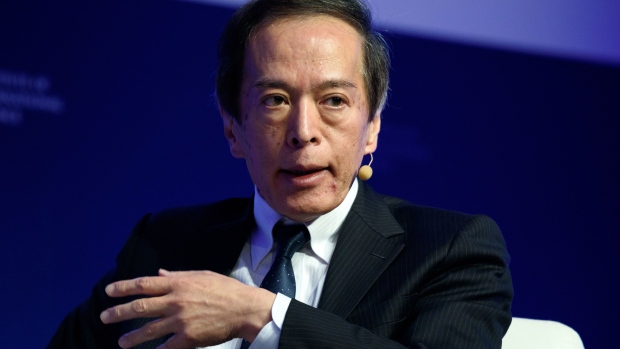Feb 10, 2023
Five Things You Need to Know About Reported BOJ Pick Kazuo Ueda
, Bloomberg News

(Bloomberg) -- Japanese Prime Minister Fumio Kishida’s reported choice of Kazuo Ueda for the top job at the Bank of Japan has blindsided markets, initially triggering a sharp rise in the yen.
Ueda’s name was absent from many polls asking who is likely to replace governor Haruhiko Kuroda, with most economists focusing on deputy governor Masayoshi Amamiya and his predecessor Hiroshi Nakaso.
As investors tune in on the surprise pick, here are five things you need to know about Ueda.
Experienced Central Banker
While the 71-year old Ueda has spent most of his working life as an academic, he served as a BOJ board member at a critical time when the central bank made one of its first forays into non-conventional monetary-policy measures between 1998 and 2005.
When the bank tried to pull away from its zero-interest rate policy, he voted against the decision. With hindsight that move created the impression that the BOJ was reluctant to stick with stimulus.
Still in Touch
While those events are now around two decades ago, it doesn’t mean Ueda has lost touch with the latest monetary policy. He’s moderated various workshops and conferences hosted by the BOJ, including one as recently as November.
He’s also the chief councillor for an academic institute within the BOJ, and generally maintains close ties with the central bank.
Former board member Takahide Kiuchi views Ueda’s reported choice as one that was strongly backed by BOJ insiders.
Not a Radical
Ueda isn’t known as someone who’s either a strong dove or a hawk, terms used to describe whether policymakers favor easy or tight money.
That suggests Kishida picked him in the hope that Ueda won’t rush into switching the BOJ away from the current ultra-easy stance, rather steering more gradual shifts in policy that don’t rock markets too much.
The Nikkei newspaper earlier reported that Kishida also tried to convince current deputy Amamiya to take the top job, even though he declined. If true, that also underscores Kishida’s intention to not seek too much policy change too soon.
Ueda currently is a professor at Kyoritsu Women’s University, but spent much of his academic career at the University of Tokyo.
Leadership Balance
While Ueda is neither a career central banker or a former finance ministry official — a rare trait for a BOJ governor — that doesn’t necessarily mean he would lack the communication channels of previous governors.
If Shinichi Uchida and Ryozo Himino are nominated as deputies as reported, Ueda will have close at hand someone who was a key part of existing monetary policy, and someone who was influential as the head of Japan’s financial watchdog agency.
Uchida especially is known as Kuroda’s right-hand man, and helped craft monetary policy with Amamiya for most of Kuroda’s decade-long term.
Lacking Diversity
While economists thought that a female BOJ governor would be unlikely, the current view is that the central bank won’t be seeing its first female deputy governor in its history either.
Read more: Japan to Lag Again on Diversity if Women Shut Out of BOJ Race
The Federal Reserve was led by Janet Yellen and the European Central Bank is still helmed by Christine Lagarde, but a BOJ led by Ueda is likely to remain clearly lagging in gender diversity compared to global peers.
--With assistance from Paul Jackson.
©2023 Bloomberg L.P.






